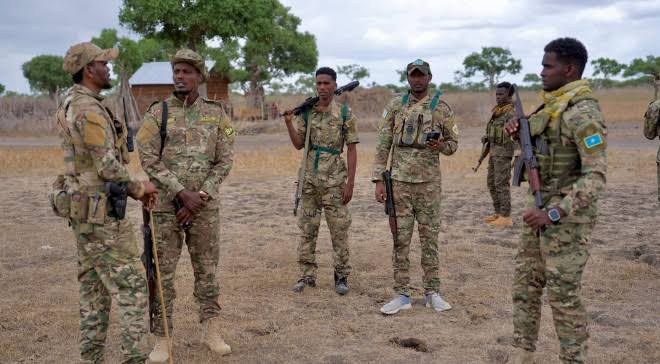Facebook Twitter (X) Instagram Somali Magazine - People's Magazine
Jubbaland’s security forces, the Dervish forces, have officially assumed control of military bases in Lower Juba that were vacated by African Union Transition Mission in Somalia (ATMIS) troops, primarily those from Kenya. The move marks a significant shift in the region’s security landscape, highlighting the increasing tensions between the Jubbaland administration and the federal government of Somalia.
Jubbaland Forces Take Control of Key Bases
Jubbaland Information Minister Abdifitaah Mohamed Mukhtar confirmed the transfer of control on Monday, telling BBC Somali that Jubbaland forces had stepped in to secure the vacated bases, ensuring the region’s stability. The withdrawal of ATMIS troops, part of the African Union’s phased withdrawal plan, had left certain areas in Lower Juba vulnerable. With these strategic military installations now under local control, the Dervish forces are expected to maintain security and prevent insurgent groups like al-Shabab from gaining ground.
Tensions Between Jubbaland and the Federal Government
Minister Mukhtar also voiced strong criticism of the federal government’s recent actions, accusing it of attempting to undermine Jubbaland’s military autonomy by offering financial incentives for disbanding local forces. He emphasized that such funds should instead be redirected to combat the al-Shabab militant group, which continues to pose a significant threat to Somalia’s stability. Mukhtar denied claims that Jubbaland forces were being absorbed into the Somali National Army (SNA), adding that only a small number of forces had joined the federal government’s military efforts in the Lower Jubba region.
Recently, videos surfaced showing over 200 Jubbaland troops participating in federal military operations in the area, which fueled speculation about a larger-scale integration. However, Mukhtar clarified that these forces were led by Commander Fanah, who had previously been stationed in Raskamboni, and were not part of a broader integration effort. “No troops from Kismayo have joined,” he confirmed, stressing that the regional forces were independent and had not ceded control to the central government.
Federal Troop Deployments and Political Divisions
In response to the shifting dynamics in Lower Juba, the Somali federal government deployed over 1,000 troops to reinforce the area, aiming to fill the vacuum left by the departing ATMIS forces and strengthen counter-insurgency operations. Prime Minister Hamza Abdi Barre defended this military buildup, calling it essential to preventing a resurgence of al-Shabab in strategically vital regions.
However, Jubbaland officials, including Minister Mukhtar, have raised concerns about the political motivations behind these deployments. According to Mukhtar, the federal government’s actions are not driven solely by security needs but by political interests aimed at undermining Jubbaland’s autonomy. These growing tensions reflect deeper divisions between Mogadishu and the semi-autonomous Jubbaland administration, highlighting ongoing struggles over power distribution, security control, and governance.
Security and Governance in Jubbaland: A Regional Challenge
The standoff between Jubbaland and the federal government has intensified since the announcement of the African Union’s planned withdrawal from Somalia, a move that has left key security gaps in the country’s conflict zones. Both the Somali federal government and Jubbaland administration have expressed concerns over the long-term implications for regional security. While the federal government seeks greater centralization, Jubbaland has consistently resisted these efforts, advocating for greater regional autonomy and local control.
The strategic importance of Lower Juba, which borders Kenya, has made it a focal point of both military and political struggles. As al-Shabab continues to exploit weaknesses in Somalia’s security infrastructure, the region remains a hotbed for conflict. Local security forces, such as the Dervish forces, are seen as crucial to maintaining stability and combating extremist groups in the absence of international peacekeepers.
Conclusion: A Divided Path Forward for Somalia
The situation in Lower Juba illustrates the broader challenges facing Somalia as it navigates the delicate balance between federal power and regional autonomy. With tensions escalating between the federal government and Jubbaland, the country’s future governance and security landscape remain uncertain. As both sides continue to jockey for control, the presence of international forces, the success of counter-insurgency efforts, and the outcome of political negotiations will determine the region’s stability in the months to come.

